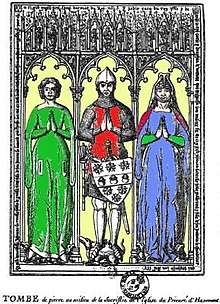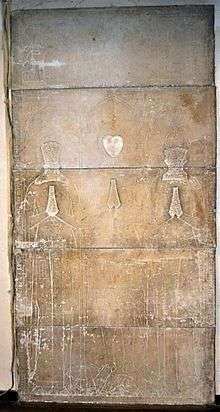Guillaume Tirel
Guillaume Tirel, known as Taillevent (French: "wind-cutter" i.e. an idle swaggerer[1]) (born ca. 1310 in Pont-Audemer – 1395), was an important figure in the early history of French cuisine. He was cook to the Court of France at the time of the first Valois kings and the Hundred Years' War. His first position was enfant de cuisine (kitchen boy) to Queen Jeanne d'Évreux. From 1326 he was queux, head chef, to Philip VI. In 1347, he became squire to the Dauphin de Viennois and his queux in 1349. In 1355 he became squire to the Duke of Normandy, in 1359 his queux and in 1361 his serjeant-at-arms. The Duke of Normandy became Charles V in 1368 and Tirel continued in his service. From 1381 he was in service to Charles VI. He is generally considered one of the first truly "professional" master chefs. He died in 1395 at around 80 years of age.


He wrote Le Viandier, a famous book on cookery and cookery technique, thought to be one of the first professional treatises written in France and upon which the French gastronomic tradition was founded. It had an inestimable influence on subsequent books on French cuisine and is important to food historians as a detailed source on the medieval cuisine of northern France. During the reign of Philip VI Taillevent was a major influence in the rise of imperial favor for the strong red wines being produced in the south of France as well as those coming out of Burgundy.[2] Actually, he now stands in The Library of Congress.[3]
Today, many restaurants named "Taillevent" capitalize on the reputation of Guillaume Tirel. "Guillaume Tirel" was also the name of a catering business in Brussels (1989–1999).
Guillaume Tirel's tombstone is preserved at the church of Église Saint-Léger de Saint-Germain-en-Laye.
See also
Footnotes
- "Cotgrave's 1611 French/English Dictionary". www.pbm.com.
- Johnson, pg. 127
- "LC Linked Data Service: Authorities and Vocabularies (Library of Congress)". id.loc.gov.
References
- Johnson, Hugh, Vintage: The Story of Wine. Simon and Schuster, 1989.
- Viandier of Taillevent: An Edition of All Extant Manuscripts. University of Ottawa Press, 1988. ISBN 0-7766-0174-1
- Le Viandier de Guillaume Tirel dit Taillevent, le Baron Jérôme Pichon et Georges Vicaire, Paris, 1892 (reprint by Slatkine Reprints, Genève, 1967).
- Online version of Le Viandier, translated by James Prescott: http://www.telusplanet.net/public/prescotj/data/viandier/viandier1.html